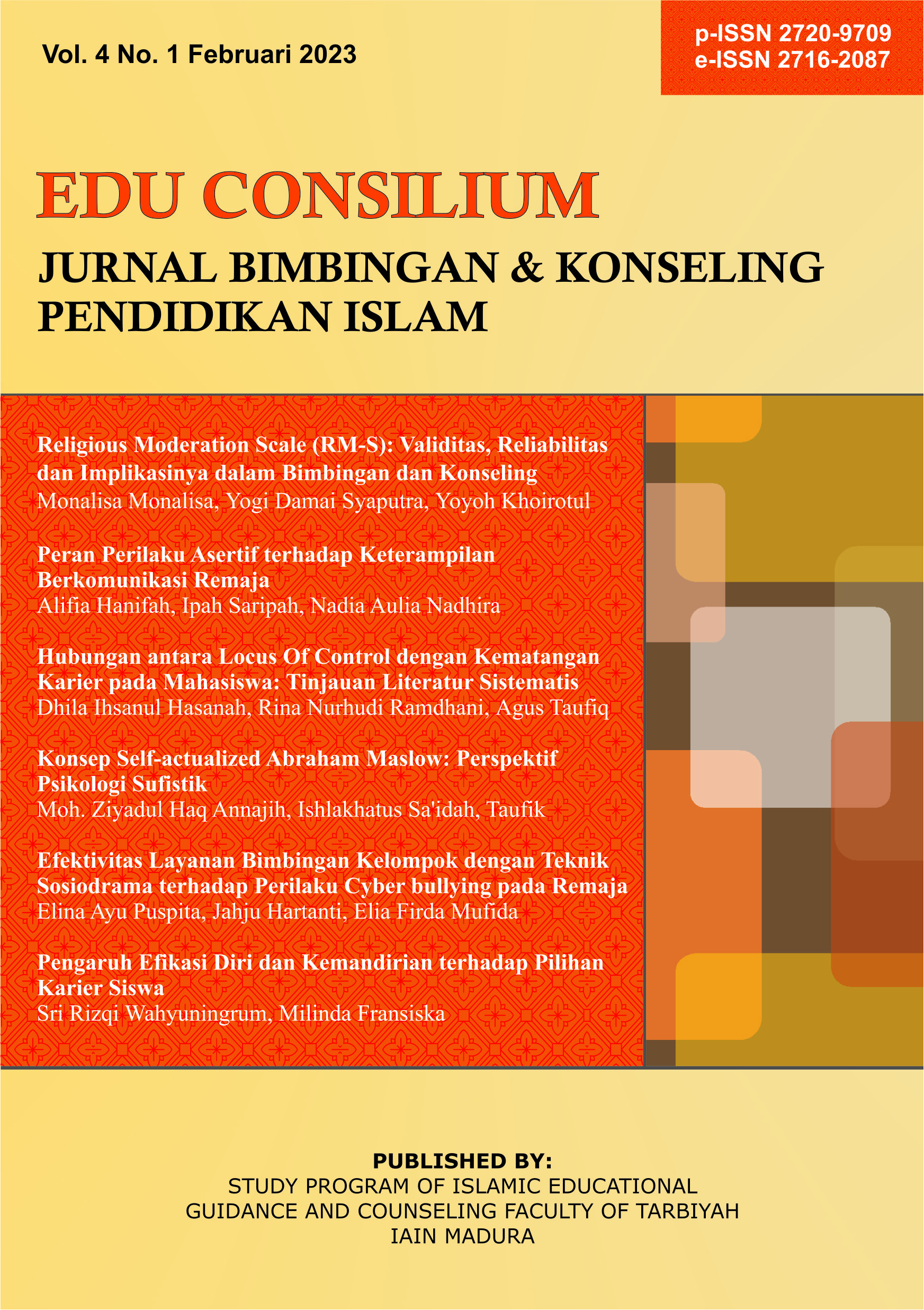Konsep Self-actualized Abraham Maslow: Perspektif Psikologi Sufistik
 Abstract views: 2368
,
Abstract views: 2368
,
 PDF downloads: 4928
PDF downloads: 4928
Abstract
Self-actualization is the peak experience in Maslow's hierarchy of needs theory. Maslow's hierarchy of needs consists of physiological needs, the need for a sense of security (safety needs), the need to have affection (social needs), esteem needs, and self-actualization. The purpose of this study is to describe how Maslow's holistic-dynamic theory describes self-actualization and the Sufistic view of the concept of self-actualization. This study employs a qualitative research method in conjunction with a type of literature review. The data collection technique used is documentation. The results of the study show that Sufistic psychology views self-actualization as a peak experience that is not absolute because humans are not just physical, mechanical beings. Ibn 'Arabi views that humans will reach a peak experience when they have abandoned themselves to unite with God (fana'); then humans must experience four levels: Shari'a, Tariqah, essence, and makrifat. In addition, al-Ghazali also emphasized the fulfillment of mashlahah al-'amm as his peak experience.
Downloads
References
’Arabi, Muhyi al-Din Ibn. (2010). Al-Futuhat Al-Makkiyah. Beirut: Dar al-Fikr.
Achmad, U. (2013). Kritik Psikologi Sufistik Terhadap Psikologi Modern: Studi Komparatif Pemikiran al-Ghazali dan Descartes (Upaya Memperkuat Bangunan Konseling Islam). Konseling Religi: Jurnal Bimbingan Konseling Islam, 4(1), 71.
Arikunto, S. (2010). Prosedur Penelitian Suatu Pendekatan Praktik. Jakarta: Rineka Cipta.
Al-Ghazali, Abu Hamid. (1996). Majmu’ah Rasa’il Al-Imam Al-Ghazali: Mi’raj Al-Salikin. Beirut: Dar al-Fikr.
Chaplin, J. P.(2008). Kamus Lengkap Psikologi. (Terjemah). Jakarta: PT RajaGrafindo Persada.
Feist, Feist. (2006). Theories of Pesonality (Terjemahan). Yogyakarta: Primasophie.
Hartono, M. S. (2015). Psikologi Konseling. Kencana.
James E. Faulconer. (2003). Transcendence in Philosophy and Religion. Bloomington: Indiana University Press.
Jaarvis, M. (2019). Teori-teori psikologi: Pendekatan modern untuk memahami perilaku, perasaan, dan pikiran manusia. Nusamedia.
Jasser Auda. (2013). Maqasid Untuk Pemula. Yogyakarta: PT Mizan Pustaka.
Kartadinata, S. (2007). Teori bimbingan dan konseling. Seri Landasan dan Teori Bimbingan dan konseling. Upi. Edu.
Louis Leahy. (1993). Manusia Sebuah Materi, Sintesis Filosofis Tentang Makhluk Paradoksal. Jakarta: PT Gramedia.
Maslow, Abraham. (1968). Toward a Psychology of Being (2nd Ed). New York: Van Nordstrand Reinhold.
Maslow, Abraham H. (1975). The Farther Reaches of Human Nature. New York: The Viking Press.
Mohamat Hadori. (2015). Aktualisasi-Diri (Self-Actualization); Sebuah Manifestasi Puncak Potensi Individu Berkepribadian Sehat. Jurnal Lisan Al-Hal 9, no. 2: 261–87.
Mujib, Abdul. (2006). Kepribadian Dalam Psikologi Islam. Jakarta: Raja Grafindo Persada.
Patterson, C. H. (1966). Theories of counseling and psychotherapy.
Purwoko, D. A. B. (2021). Studi Kepustakaan Penerapan Konseling Realita Terhadap Penerimaan Diri Peserta Didik. Konseling, Bimbingan Pendidikan, Fakultas Ilmu Surabaya, Universitas Negeri Konseling, Bimbingan Pendidikan, Fakultas Ilmu Surabaya, Universitas Negeri, 31–41.
Rahman, F. (2011). Pendidikan multikultural dalam perspektif psikologi sufistik. Jurnal Tarbiyatuna Pendidikan Agama Islam, 1(1).
Sa'idah, I. (2019). Teori Dan Teknik Konseling.
Sabiq, Z. (2016). Konseling Sufistik: Harmonisasi Psikologi Dan Tasawuf Dalam Mewujudkan Kesehatan Mental. 'Anil Islam: Jurnal Kebudayaan dan Ilmu Keislaman, 9(2), 328-352.
Sajidah, Ida. (2017). Konsep Kesempuranaan Diri Menurut Ibn ’Arabi Dan Maslow. Jakarta: Al-Wasat Publishing House.
Sarwono, Sarlito W. (2002). Berkenalan Dengan Aliran-Aliran Dan Tokoh-Tokoh Psikologi. Jakarta: Bulan Bintang.
Schultz, D. (2010). Psikologi Pertumbuhan; Model-Model Kepribadian Sehat. (Terjemah). Edited by Kanisius. Yogyakarta.
Siti Muazaroh, Subaidi. (2019). Kebutuhan Manusia Dalam Pemikiran Abraham Maslow. Al-Mazahib 7, no. 1: 17–33.
Sugiyono. (2012). Metode Penelitian Kuantitatif Kualitatif dan R&D. Bandung: Alfabeta.
Wilcox, Lynn. (2012). Psikologi Kepribadian: Analisis Seluk-Beluk Kepribadian Manusia. Yogyakarta: IRCiSoD.
Yunasril Ali. (1997). Manusia Citra Ilahi: Pengembangan Konsep Insan Kamil Ibn ’Arabi Oleh Al-Jili. Jakarta: Paramadina.
Yusuf, S. & Nurihsan, A. J. (2006). Landasan Bimbingan Dan Konseling. Bandung: PT Remaja Rosdakarya.
The journal operates an Open Access policy under a Creative Commons Non-Commercial 4.0 International license. Authors who publish with this journal agree to the following terms:
- Authors retain copyright and grant the journal right of first publication with the work simultaneously licensed under a
 Commons Attribution-NonCommercial 4.0 International License
Commons Attribution-NonCommercial 4.0 International Licensethat allows others to share — copy and redistribute the material in any medium or format, and adapt — remix, transform, and build upon the material.
- Authors are able to enter into separate, additional contractual arrangements for the non-exclusive distribution of the journal's published version of the work (e.g., post it to an institutional repository or publish it in a book), with an acknowledgement of its initial publication in this journal.
- Authors are permitted and encouraged to post their work online (e.g., in institutional repositories or on their website) prior to and during the submission process, as it can lead to productive exchanges, as well as earlier and greater citation of published work (see The Effect of Open Access).




















